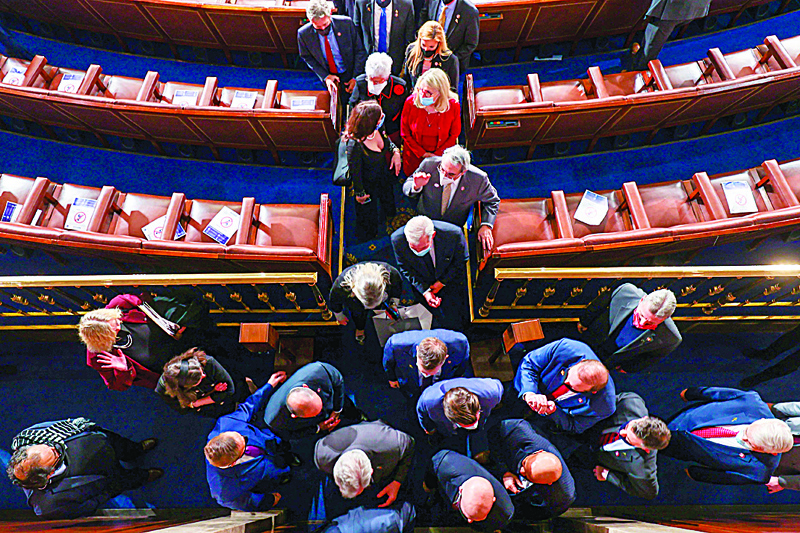
WASHINGTON: Sporting a black mask, Democrat Nikema Williams is well aware of Washington's toxic political divisions and the challenges of a deadly pandemic - the newly elected African American congresswoman is a COVID survivor. "It's a new day in Congress," Williams said as she walked the halls of Capitol Hill Sunday, her first official day as a US lawmaker.
Williams, from Georgia, is taking over the House seat of none other than legendary late civil rights icon John Lewis. Her priority in the opening weeks? Given that she "didn't know if I was going to live or die" during her three-week illness, Williams said her top priority is building up a national response to the coronavirus. By constitutional mandate a new Congress is sworn in every two years on Jan 3, which accounts for this rare weekend session.
The incoming freshman class consists of 59 new members including Williams and, on the opposite side of the aisle, members such as the far right conservative Marjorie Taylor Greene, who supports the controversial and widely debunked Q Anon conspiracy movement. Sunday looked decidedly different than other opening days, with members wearing face masks as they raised their right hands to take their oath of office.
Social distancing was mandated - but not always adhered to - on the House and Senate floor to undertake one of their first tasks, the election of speaker of the House. Democrat Nancy Pelosi narrowly won a vote to remain in the role after serving as speaker for the past two years.
But a dark political cloud hung over Washington. And the divisions were underscored when a staggering audio tape was released Sunday in which President Donald Trump asked Georgia officials to "find" enough votes to overturn his election defeat, sending shockwaves through Washington.
"To say the 117th Congress convenes at a challenging time would indeed be an understatement," Senate Majority Leader Mitch McConnell told his chamber after Vice President Mike Pence swore in new members. "From political division to a deadly pandemic to adversaries around the world, the hurdles before us are many and they are serious."
'Clean conscience'
Tomorrow, a joint session of Congress is set to certify the Electoral College vote that confirms Joe Biden as the next president. But Republican rebels will throw the centuries-old process - whose certification vote is normally a drama-free formality - into turmoil.
Several loyalists to outgoing President Donald Trump have signaled they oppose certification, repeating Trump's baseless argument that the Democrat stole the election through massive fraud. The outlandish gambit is all but assured to fail, but the explosive nature of contesting the process itself will be a strain on democracy.
Republican Congressman Adam Kinzinger urged Trump loyalists to reconsider opposing certification in light of the Georgia tape. "This is absolutely appalling. To every member of Congress considering objecting to the election results, you cannot - in light of this - do so with a clean conscience," he tweeted. Republican incoming congressman Scott Fitzgerald of Wisconsin said he remained unsure about siding with the rebels or voting to confirm Biden's presidency. "I haven't figured it out yet," he told AFP.
For Williams, the path was clear, however: "The voters have spoken, and it's time that we move forward with a peaceful transfer of power," she said. New US Senator John Hickenlooper, a seasoned former governor of Colorado and a 2020 Democratic presidential hopeful, said he was honored to be in his new role but waved off concerns about tomorrow's vote. "On January 20 Joe Biden is going to become the president," he told AFP. "Obviously there's a lot of politics between now and then."
Pence, who oversees tomorrow's vote, ignored reporters' questions about how he will handle the potentially disruptive scenario. But Emanuel Cleaver, a House Democrat and ordained minister, appealed for divine intervention as he delivered the chamber's opening prayer and sought strength for lawmakers to control their "tribal tendencies" and work together. "God, at a moment when many believe that the bright light of democracy is beginning to dim, empower us with an extra dose of commitment to its principles," Cleaver said. - AFP









